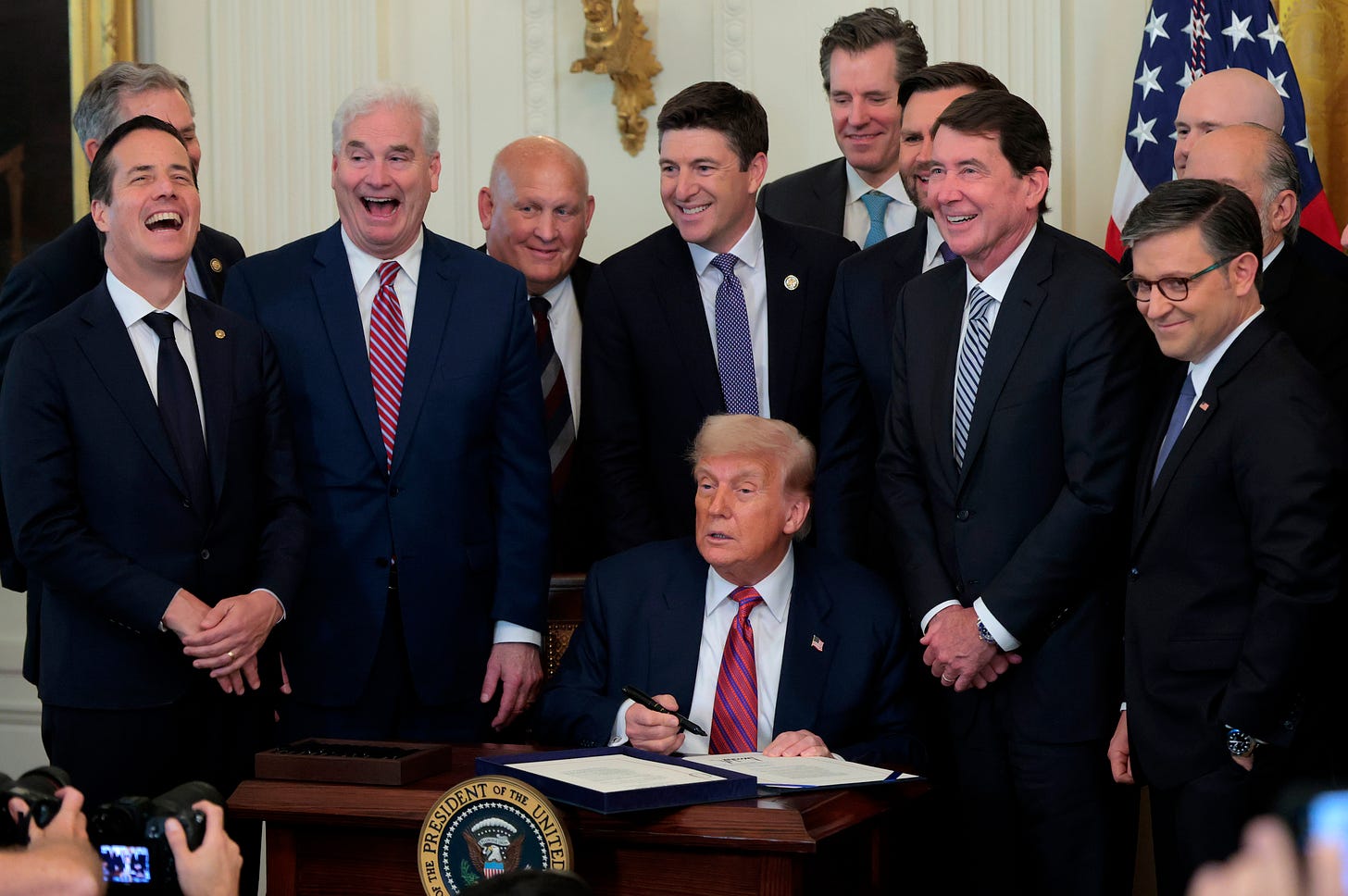📰 📱 📰 With corporate outlets like CBS obeying in advance, supporting independent political media is more important than ever. Public Notice is possible thanks to paid subscribers. If you aren’t one already, please click the button below and become one to support our work. 📰 📱 📰
If you asked Donald Trump even the most basic questions about what cryptocurrency is and how it works, he would probably be unable to offer you anything coherent. What he does know is that it is a gigantic spigot of money, and since he attached his pockets onto it not long ago, he has gotten richer faster than at any time in his up-and-down career.
So last week Trump was only too happy to lobby for, and then sign, the first of a series of bills crafted by and for the crypto industry.
The GENIUS Act (short for Guiding and Establishing National Innovation for US Stablecoins) is now law, and next up is the Digital Asset Market Clarity Act, which has passed the House and is awaiting action in the Senate. Depending on who you ask, these bills will either dramatically increase the number of Americans who lose their money in crypto while threatening a devastating crash that could rival the 2008 financial crisis, or bring us to an exciting new era of “financial innovation” free from the oppressive hand of meddling government bureaucrats.
Either way, it’s a story of the remarkable power of money in politics, and of presidential corruption on a scale that not long ago was unimaginable.
In the years leading up to the 2024 election, the cryptocurrency industry had a problem. The government in Washington was skeptical of crypto to the point of hostility, seemingly agreeing with the widespread opinion that crypto has few if any legitimate uses and is so volatile that to protect Americans it must be regulated strictly. Gary Gensler, who was chair of the Securities and Exchange Commission under Joe Biden, said the industry was “rife with fraud, scams and abuse,” and worked hard to rein it in.
The crypto industry’s answer to that problem was not simply to fight against regulation. The smarter play — after getting rid of regulators like Gensler, whom Trump told a 2024 Bitcoin conference that he’d fire to wild applause — is to shape regulation to your liking. That can be an especially fruitful approach at an early stage when members of Congress don’t really understand the industry and are easily manipulated.
So that’s what the crypto industry set out to do, and the first step was to get a Congress that would be open to pro-crypto legislation. While most voters were not aware of it, the crypto industry quietly became one of the biggest spenders in the 2024 campaign. They searched out troublesome candidates whom they could obliterate, both to remove impediments to legislation and to strike fear in those who might oppose them in the future. The industry dropped $10 million in ads opposing Rep. Katie Porter, a vocal crypto opponent, in the California Senate primary; she lost to Sen. Adam Schiff, who was one of 18 Senate Democrats who voted for the GENIUS Act.
Porter wasn’t the biggest scalp the industry bagged. A crypto PAC with the innocuous name Defend American Jobs spent an astonishing $40 million in a single Senate race, boosting Bernie Moreno in his successful campaign to oust crypto skeptic Sherrod Brown in Ohio. That was just part of the $245 million the industry spent on the 2024 campaign.
They also undertook a lobbying campaign directed at Trump personally. As the New York Times reported, “Lacking much knowledge of its intricacies, Mr. Trump embraced crypto when he saw it could generate huge profits for himself or his political groups, while outsourcing the details to industry advisers with their own business ambitions.”
The industry is now looking to repeat its success in next year’s midterms. Fairshake, one of the main crypto PACs, just reported that it has raised $109 million since election day 2024 and now has $141 million on hand, a number that will no doubt balloon as the election approaches.
A note from Aaron: Enjoying this piece from Paul? Then please sign up to support our work 📈 Paid subscribers keep PN free for everyone 📈
Crypto’s big wins on Capitol Hill
Last Thursday, the House passed the GENIUS Act, which provides a regulatory framework to stablecoins. It had already passed the Senate and Trump signed it the next day. While a small group of conservative Republicans voted no because they wanted the bill to also include a measure barring the Federal Reserve from issuing digital currency (something the Fed has never shown any interest in), the bill passed with the support of almost the entire GOP caucus, along with 102 Democrats.
The bill provides some regulatory guardrails for stablecoins, which are pegged to the value of another currency (usually the US dollar) and thus don’t swing around in value. But it also would allow a range of private companies to create stablecoins, provided they hold real money in reserve to back them; some critics worry that lax oversight could produce a wave of stablecoin runs that would require government bailouts.
Stablecoins do have utility beyond the traditional crypto uses of money laundering, buying illegal drugs or a hitman, or paying up when a Russian gang launches a ransomware attack on your hospital. For instance, a company connected to the United Arab Emirates government bought $2 billion in stablecoins issued by World Liberty Financial, the Trump family crypto firm, enabling the family to use the actual money it received to make tens of millions of dollars in interest. It’s not a bribe, just a mutually beneficial business deal between the president and a foreign government.
The GENIUS Act does prohibit “any member of Congress or senior executive branch official from issuing a payment stablecoin during their time in public service” — but not the president! Depending on how you calculate it, crypto holdings now make up the majority of Trump’s wealth. But he’s not alone — this is an administration brimming with crypto bros.
The Washington Post examined financial disclosures and “identified nearly 70 nominees and officials of the Trump administration who held cryptocurrency or have invested in crypto or blockchain companies.” The largest, at $122 million, was held by Ken Howery, who co-founded PayPal along with Elon Musk and Peter Thiel and was nominated by Trump to be ambassador to Denmark (he has not yet been confirmed). Trump’s AI and crypto “czar,” David Sacks, sold $200 million in crypto assets before coming to the White House; someone probably should have told him that there’s no such thing as a conflict of interest in the Trump administration.
These holdings frequently overlap with the officials’ governmental responsibilities. For instance, last month Bill Pulte, the director of the Federal Housing Finance Agency, directed Fannie Mae and Freddie Mac to consider cryptocurrency holdings when assessing qualifications for mortgages, which they previously did not do because crypto was considered too volatile. Pulte’s financial disclosure indicates that he holds between $1 million and $2 million in cryptocurrency.
That’s just one example of the kind of policy change the industry is after. They would like a government less interested in going after crypto scams, which they’re already getting. The administration is pulling back from going after some crypto crimes, dropping enforcement actions against crypto firms, and shelving investigations. But it’s not just about loose enforcement — they also want the government to actively promote crypto.
The Financial Times reported last week that Trump is planning to issue an executive order opening up retirement accounts like pensions and 401(k)s to crypto, which would mean a giant new potential market. He already signed an executive order to create a Strategic Bitcoin Reserve, which would have no practical purpose other than driving up the price of Bitcoin (it’s not like in a war or disaster we’ll desperately need a bunch of Bitcoin in the same way we might need oil, which was the point of creating the Strategic Petroleum Reserve).
You’ll never guess who that would be good for! On Monday, the Trump Media and Technology Group (the entity that runs Truth Social, the entire revenue of which is about the same as a single McDonald’s), announced that it had purchased $2 billion in Bitcoin. If its value goes up, so does Trump’s wealth.
All of this action serves one of the central goals of the industry: for crypto to be legitimized and promoted in every possible part of the economy, to convince more people to put their money in it. After all, the guiding philosophy of crypto, in the title of journalist Zeke Faux’s book on the industry, is “Number go up” — the goal is to get more and more people to buy crypto so the price of the assets will be driven ever higher. Legitimation is key to widening the pool of potential marks — excuse me, investors.
There’s a lot more at issue here. For instance, the crypto industry is very keen to move as much regulatory oversight away from the Securities and Exchange Commission, which regulates stocks and bonds, and under the lighter touch of the Commodity Futures Trading Commission. The Clarity Act would accomplish that for some forms of crypto, while exempting others from almost all regulatory scrutiny, which has some advocacy groups sounding alarms.
This is confusing — which is just the problem
If you find crypto confusing, you’re hardly alone — it’s a good bet that many of the legislators who voted for the GENIUS Act and the Clarity Act don’t really understand it, either.
As befits a financial instrument whose uses include concealing the identities of those moving large amounts of money around the world, delving into individual crypto stories can lead one through a maze of fake names, fictitious companies, and confusing lingo. When you read investigative stories posing questions like “How did a 30-year-old Chinese-Brazilian finance professional working for a Chinese state energy company secure $100 million to buy crypto tokens from the President of the United States’ main crypto firm?”, it’s natural to assume this is beyond the comprehension of all but the most obsessive.
Which is exactly the point. The communication from crypto boosters about these bills is filled with excited language about how awesome crypto is, how prior to now the true genius and creativity of the crypto sector has been stifled by regulatory spoilsports, and once the bills are passed, “the next generation of financial innovation” can begin, with glory and riches surely raining down on us all.
Anyone who remembers the run-up to the financial crisis of 2008 knows that when people in the finance world start talking about “innovation,” we should all be very nervous. After the GENIUS Act passed both houses, the total value of the crypto market shot past $4 trillion, and as any crypto advocate will tell you, in the future they envision, that’s nothing compared to the heights crypto could reach. What could possibly go wrong?
That’s it for today
We’ll be back with more tomorrow. If you appreciate today’s newsletter, please do your part to keep Public Notice free by signing up for a paid subscription.
Thanks for reading, and for your support.









I can see crypto leading to a broader market crash.
Being unregulated, it appears to be a Ponzi scheme, a haven for obscuring the funds from criminal activity, and a way to hide wealth.
If it looks too good to be true, it’s too good to be true. There are too many folks who want to get rich quick & will jump right on this Ponzi scheme & lose their hard earned dollars in the end.
If the money that lobbyists & corporations spend on influencing congressional members was spent on helping working-class Americans, it would be a much better world for all of us.